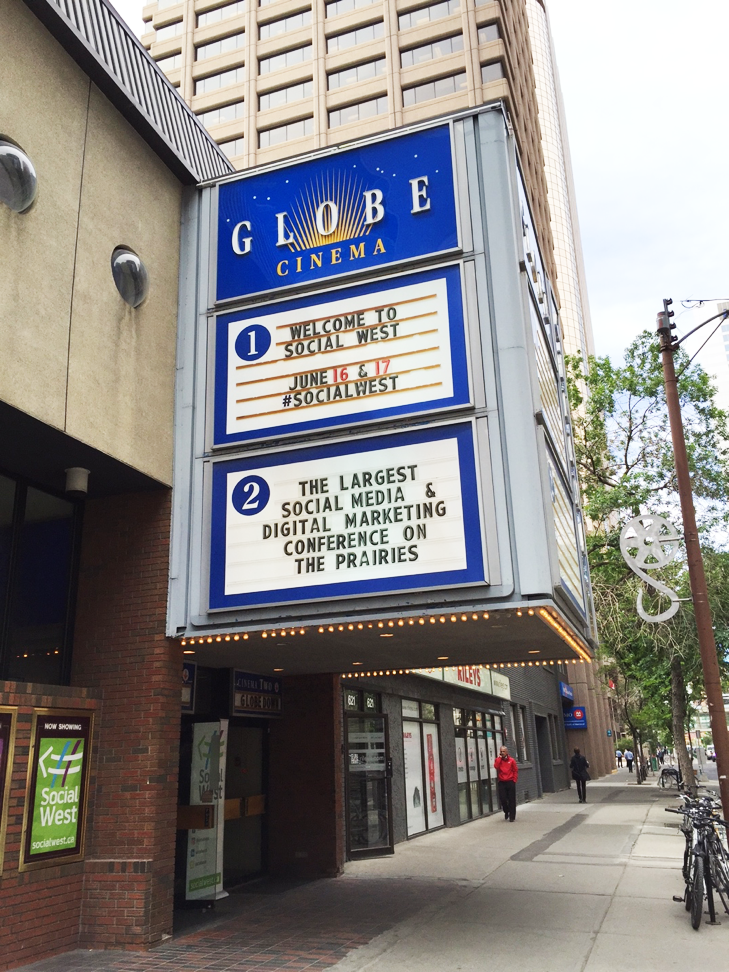Managing the Online Reputation of Your Small Business
Last month, armed with a tablet and a name tag, I attended my first social media conference – Social West. Held in Calgary, Alberta, the three-day event is spearheaded by Mike Morrison, author of Mike’s Bloggity Blog. Delivering on its promise as the largest social media and digital marketing conference of the prairies, it showcased a variety of local and international experts on a broad number of topics, from snapchat to crisis management.

Negative feedback: a subject on our collective minds
As I sat through more presentations, and they opened the floor to questions, I noticed a common thread emerging. Inevitably someone would pipe up, “How do you respond to negative feedback?” For panels such as “The Darker Side of Digital – Managing Crises on Digital Channels” and “The Insane Power of Online Review for Small Businesses,” this question was expected. However, it was also a concern during sessions like “How to Manage Social Media 24 Hours a Day” and “The Power of Pinterest: Putting Pinterest to Work for You.” In short, whether it’s a negative review on a business page or an aggressive hater on Twitter, we all want to know how to handle criticism constructively.
A typical, and unsuccessful, strategy is silence
For small companies with a limited marketing budget, offline and online word-of-mouth is crucial to generating business. It may seem obvious that negative feedback online, regardless of channel, should be handled promptly. But you would be surprised at how often small businesses leave online comments unaddressed. This could be for a number of reasons:
They wear too many hats. Small business owners, for instance, are often juggling multiple roles within their business. They may not have the financial resources to hire someone to handle their social media accounts and update review service sites like Yelp and TripAdvisor. If they do decide to monitor it themselves, it can be overwhelming. As a result of overload, it’s easy to miss a mention or a review.
They take it personally. It can be difficult to answer negative feedback on a public forum. A business can be a large part of someone’s personal identity and therefore confrontation, in general, is unpleasant. But, as pointed out by Edelman Vice President Dave Fleet during his Social West presentation on Crisis Management, when it comes to negative feedback, “You should connect emotionally, but don’t react emotionally.”
They don’t feed the trolls. This is an exceptional case. If an online commenter is clearly a troll, then engaging can make the situation worse. Abusive users are not looking to create a dialogue or be informative, they just want to start trouble. Silence, blocking, or alerting the appropriate authorities are the best options.
They underestimate its impact. Social media drives traffic and boosts brand awareness and yet many companies still consider it a “necessary evil” rather than an exciting tool. A 2015 report by Nielsen on “Global Trust in Advertising” revealed that two-thirds (66%) of survey respondents say they trust opinions posted online by fellow consumers. Studies on consumer behavior also found that potential buyers often perceive online consumer reviews as more credible and relevant than product or service information distributed by marketers or experts.
Of course, a 1-star review on Yelp isn’t the end of a business, but a failure to engage with an audience online means experiencing all the drawbacks of negative comments and none of the benefits.
What are the consequences of negative feedback?
It turns off customers. Personally, before calling a plumber or scheduling an appointment with a specialist, I check out their reviews. And if a business only has a few reviews, bad ones can stand out like a coffee stain on a white shirt. Sure, there could be valid explanations behind these negative experiences. Or the owner could have fixed the situation with the individual in private. However, unless there is an online response to the criticism, the other side of the story will remain unread by the browsing public.
It impacts SEO. You may have noticed that Google review scores appear on Google ads. A low score could mean the difference between someone clicking on your ad versus a competitor. Additionally, negative review scores on sites like Yelp are also taken into account in search engine algorithms when determining your site’s ranking.
It blemishes a brand. Memory is unreliable, and it also favours negative information. This psychological quirk is referred to as the negativity bias, or negativity effect, and it has been the subject of a number of marketing and consumer studies. Furthermore, according to a neat little book, “100 Things Every Designer Should Know About People” by behavioral psychologist Susan Weinschenk, even if a customer has a positive experience with your business, a subsequent bad experience can retroactively taint previous positive experiences. Yikes!
Let’s turn the negatives into a positive
It’s not all bad! Most of these issues can be mitigated by good customer service. Responding to negative feedback online:
Demonstrates you’re listening. Social media for business is not about passively posting website content. It’s about having another dedicated channel of communication with your audience. In Westjet’s Social West panel, Emerging Media Manager Greg Hounslow demonstrated the speed at which their customer service team answered queries through twitter. Within minutes, con-goers had a response! This is an extreme example. However, customer expectations are changing with technology, and include a desire for personalized service and quicker response times.
In general, answering queries and concerns is an opportunity to re-engage with your customer, to right a wrong, or address a misunderstanding. By taking the time to promptly and thoughtfully respond, the public will view your company as attentive, open-minded and personable. You may even end up turning a displeased reviewer into a brand ambassador.
Provides credibility. Have you ever felt like something was too good to be true? If a business’ reviews are all 5 stars, an audience may become suspicious. Did they buy these reviews? Are they fake? In contrast, a few lower-rated reviews that are thoughtfully replied to demonstrate that your business learns from its mistakes and is responsive to its customers.
Creates useful information. True, there is the rare client or customer that will find something negative to say, no matter what. Even if it’s something completely out of your control. But, overall, the feedback given on review sites can become helpful market research. Not only is it a personal look into your customer’s experience, it is written in the language of the consumer. These insights can inform service or product upgrades or even marketing copy.
Okay, we’ve discussed why managing your online reputation is important for small businesses. Now you’re ready to respond to customers. But what should you do or say? That’s a topic for a future blog!


